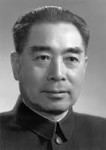 Zhou Enlai (1898-1976) was a Chinese communist revolutionary and political leader. He served as premier and foreign minister in the People’s Republic of China, and was the country’s second most influential figure after Mao Zedong. Born in eastern China to a family of scholars and bureaucrats, Zhou received a modern education in Shenyang. He studied the literature of Chinese reformers and became interested in Marxism in his late teens. In 1919 Zhou participated in the May 4th Movement, a wave of student demonstrations that formed a popular base for Chinese communism. Zhou continued his involvement in left wing groups, leading to his arrest in 1920. He joined the Chinese Communist Party, spent time in Europe and worked as a commissar at the Huangpu Military Academy.
Zhou Enlai (1898-1976) was a Chinese communist revolutionary and political leader. He served as premier and foreign minister in the People’s Republic of China, and was the country’s second most influential figure after Mao Zedong. Born in eastern China to a family of scholars and bureaucrats, Zhou received a modern education in Shenyang. He studied the literature of Chinese reformers and became interested in Marxism in his late teens. In 1919 Zhou participated in the May 4th Movement, a wave of student demonstrations that formed a popular base for Chinese communism. Zhou continued his involvement in left wing groups, leading to his arrest in 1920. He joined the Chinese Communist Party, spent time in Europe and worked as a commissar at the Huangpu Military Academy.
Zhou Enlai participated in the Long March of 1934, later emerging as a significant party leader alongside Mao Zedong. He also served as a military tactician during the Chinese Civil War. Zhou became premier of China after the communist victory in 1949. A skilled negotiator and a political realist, Zhou proved an ideal counterbalance to the more passionate and impulsive Mao. While Mao attempted radical socialist reforms to Chinese economy and society, Zhou handled matters of foreign policy, formulating responses to the Korean War, Sino-Soviet affairs and Chinese relations with the West. It was Zhou who encouraged rapprochement with Americans in the early 1970s, arranging visits to China by US Secretary of State Henry Kissinger and President Richard Nixon. Zhou also initiated better relations with China’s other Cold War rivals, including Japan, West Germany, Italy, Canada and Australia.
By the mid 1970s Zhou had fallen foul of Mao Zedong, due to differences over the Cultural Revolution. Zhou died of cancer in January 1976. According to some accounts Zhou’s cancer was diagnosed as early as 1972 but Mao ordered the test results be concealed from Zhou and his family. While Mao was apparently glad to have him out of the way, Zhou was widely mourned by the Chinese people. Despite government bans around two million people gathered in Tiananmen Square, Beijing to mourn Zhou’s death.
Content on this page is © Alpha History 2018-23. This content may not be republished or distributed without permission. For more information please refer to our Terms of Use.
This page was written by Jennifer Llewellyn and Steve Thompson. To reference this page, use the following citation:
J. Llewellyn & S. Thompson, “Zhou Enlai”, Alpha History, accessed [today’s date], https://alphahistory.com/coldwar/zhou-enlai/.
